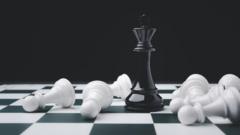Can OpenAI Outplay Elon Musk's Grok in the AI Chess Showdown?

OpenAI's o3 Model Triumphs in AI Chess Tournament Against Elon Musk's Grok
The recent AI chess tournament has set the stage for a fierce rivalry between tech giants, showcasing the advancements in artificial intelligence through their everyday-use models. OpenAI's o3 model emerged victorious, defeating xAI's Grok 4 in a thrilling final that highlighted both the capabilities and the current limitations of AI in strategic games like chess. This tournament not only pitted sophisticated AI models against each other but also emphasized the ongoing competition between Sam Altman and Elon Musk, two of the most prominent figures in the AI landscape today.
The Significance of Chess in AI Development
Chess has historically been a proving ground for computer intelligence, serving as a benchmark for assessing the capabilities of various AI systems. The game’s complexity, with its myriad of possible moves and strategies, makes it an ideal arena for testing machine learning algorithms. Unlike traditional chess engines designed explicitly for the game, this tournament featured models created for broader applications, underlining how adaptable and intelligent these systems have become.
The Tournament Structure
The AI chess tournament took place on Kaggle, a platform owned by Google that facilitates data science competitions. Eight prominent AI models from companies like OpenAI, xAI, Anthropic, Google, and others participated in this three-day event. The structure allowed these models to demonstrate their skills not only in chess but also in reasoning and strategic thinking—key attributes that define advanced AI systems.
OpenAI's o3 Model: The Unbeaten Champion
OpenAI's o3 model showcased its strength by remaining unbeaten throughout the tournament. It secured a decisive victory against Grok 4 in the final match, which was particularly noteworthy given that Grok had previously shown signs of dominance. The final match, however, revealed vulnerabilities within Grok's gameplay, leading to significant errors such as losing its queen multiple times. Chess grandmaster Hikaru Nakamura pointed out that while Grok initially appeared formidable, its performance deteriorated under pressure, allowing o3 to capitalize on its mistakes.
The Rivalry Between OpenAI and xAI
This tournament has intensified the rivalry between OpenAI and Elon Musk’s xAI, as both co-founders claim their respective models are the pinnacle of AI intelligence. Musk, in particular, downplayed Grok's prior success, suggesting that it was a byproduct of minimal effort focused on chess. The competitive spirit between these companies will likely drive further innovations in AI capabilities, as both sides strive to prove their superiority.
Performance Insights: The Rise and Fall of Grok
Pedro Pinhata, a writer for Chess.com, reflected on Grok's unexpected decline during the tournament. Despite a strong start, Grok's performance faltered, with numerous blunders that ultimately led to its defeat. This inconsistency raises intriguing questions about the reliability of AI models and their learning processes in high-pressure environments. Such setbacks underscore the complexity of programming AI to handle strategic games, where decision-making must be both quick and accurate.
AI's Ongoing Journey in Chess Mastery
While AI has made significant strides in chess, it is essential to recognize that these models are still evolving. The tournament highlighted that, despite their remarkable capabilities in various domains, AI systems like Grok and o3 are still refining their chess-playing abilities. The errors made by Grok, such as repeated losses of critical pieces, highlight the ongoing need for improvement and adaptation in AI programming.
The Historical Context of AI in Chess
The use of chess as a benchmark for AI performance is not new. In the late 1990s, IBM's Deep Blue famously defeated world champion Garry Kasparov, marking a significant milestone in the development of machine intelligence. This event was a turning point that showcased how far computers had come in mastering complex games. Today, AI developers continue to leverage chess to assess their models' strength and adaptability.
The Role of Benchmarks in AI Development
Benchmarks are critical in evaluating AI models across various tasks, including reasoning, coding, and strategic gameplay. These tests help developers identify strengths and weaknesses in their systems, guiding improvements and refinements. Chess serves as an ideal benchmark due to its complexity, requiring a combination of strategic thinking, foresight, and adaptability.
Future Implications of AI in Chess and Beyond
The outcomes of this tournament hint at broader implications for AI development across various fields. As models like OpenAI's o3 and xAI's Grok continue to evolve, their applications extend beyond games into realms such as natural language processing, data analysis, and creative writing. The competitive nature of AI development will likely accelerate innovations, leading to even more sophisticated systems that can tackle complex challenges.
Conclusion: The Next Frontier for AI
The recent AI chess tournament serves as a reminder of the rapid advancements in artificial intelligence, particularly in the realm of strategic games. OpenAI's triumph over xAI's Grok highlights not only the capabilities of these systems but also the challenges they face. As AI continues to evolve, the implications for various industries could be profound, potentially reshaping how we think about intelligence and machine learning. With the rivalry between these tech giants heating up, one can only speculate what the next chapter in AI development will entail.
FAQs
What is the significance of chess in AI development?
Chess serves as a benchmark for evaluating the capabilities of AI systems, testing their strategic thinking and decision-making abilities in a complex environment.
Who won the AI chess tournament?
OpenAI's o3 model emerged victorious, defeating xAI's Grok 4 in the final match of the tournament.
What were Grok's mistakes during the tournament?
Grok made several critical errors, including losing its queen multiple times, which contributed to its defeat in the final match against o3.
How are AI models evaluated in competitions?
AI models are evaluated through benchmarks that assess their skills in reasoning, coding, and strategic gameplay, allowing developers to identify strengths and weaknesses.
What does the rivalry between OpenAI and xAI mean for AI development?
The rivalry may drive further innovation and improvements in AI capabilities, as both companies strive to demonstrate their superiority in the field.
As we witness the evolution of AI and its applications in various fields, how will these advancements reshape our understanding of intelligence? #AI #Chess #Technology
Published: 2025-08-08 11:40:14 | Category: technology



